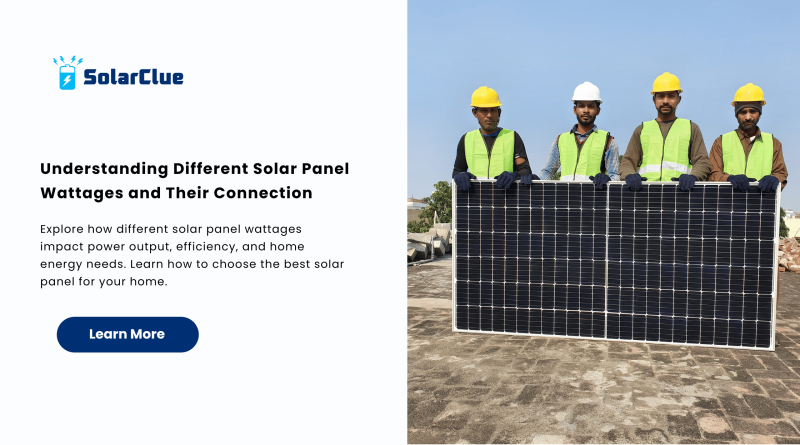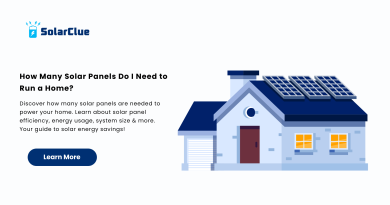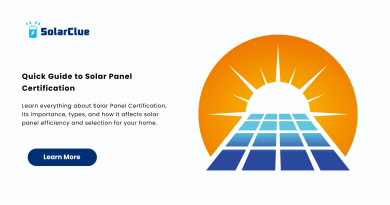Understanding Different Solar Panel Wattages and Their Connection
Solar panel wattage refers to the amount of electricity a panel can produce under ideal sunlight conditions. It is one of the most important specifications to consider when choosing a solar panel for home use. Measured in watts (W), this number directly affects the solar panel energy output and efficiency of your system.
Table of Contents
- 1 Why Do Solar Panels Have Different Wattages?
- 2 How Is Solar Panel Wattage Connected to Efficiency?
- 3 Solar Panel Power Output and Home Usage
- 4 High Wattage Solar Panels vs. Low Wattage
- 5 Factors to Consider When Choosing Panel Wattage
- 6 How to Choose Solar Panel Wattage for Your Home
- 7 The Role of Solar Panel Brands and Technology
- 8 Understanding the Real-World Solar Panel Energy Output
- 9 Integration with a Complete Solar Power System
- 10 Are High Wattage Solar Panels Always Better?
- 11 Environmental Impact of Choosing the Right Wattage
- 12 Common Myths About Solar Panel Wattage Explained
- 13 Case Studies: Real-Life Installations
- 14 Final Thoughts on Solar Wattage Selection
- 15 FAQs
Why Do Solar Panels Have Different Wattages?
Different solar panel wattages are designed to meet diverse energy needs. For instance, a 100W panel might be perfect for small devices or RVs, while a 400W panel is better suited for full solar power systems in residential homes. This variety allows consumers to customize their setup according to their power requirements and space availability.
How Is Solar Panel Wattage Connected to Efficiency?
The solar panel efficiency indicates how well a panel converts sunlight into electricity. While wattage tells you how much power a panel can produce, efficiency shows how effectively it uses sunlight. High wattage doesn’t always mean high efficiency—it depends on the quality of materials and technology used.
Solar Panel Power Output and Home Usage
When installing solar power for homes, understanding solar panel power output is key. If your home requires 5kW of power per day, using five 400W panels would be more space-efficient than using ten 200W panels. Always match panel wattage to your home’s daily energy consumption.
High Wattage Solar Panels vs. Low Wattage
High wattage solar panels (above 350W) are typically more efficient and reduce the number of panels needed, saving space and installation costs. On the other hand, low watt solar panels are often used for small, off-grid applications where portability or limited space is crucial.
Factors to Consider When Choosing Panel Wattage

1. Roof Size and Orientation
Larger roofs can accommodate best solar panels for home in higher wattages, while smaller roofs might need fewer but more efficient panels.
2. Energy Needs
Use a solar panel wattage calculator to estimate your daily energy use and find the total wattage required to meet those needs.
3. Budget and ROI
Higher wattage panels may cost more upfront but often result in better long-term savings.
How to Choose Solar Panel Wattage for Your Home
Choosing the right wattage involves balancing energy needs, roof space, and budget. Consider future energy consumption too—if you plan to buy an EV or expand your home, go for higher wattage now.
The Role of Solar Panel Brands and Technology
Premium brands offer best solar panel models with high wattage and efficiency, using advanced technologies like half-cut cells or PERC cells. Check user reviews and warranty terms for reliability.
Understanding the Real-World Solar Panel Energy Output
Wattage ratings are based on lab conditions. Real-world output varies due to shading, temperature, and angle of sunlight. Monitoring systems help track your system’s actual performance.
Integration with a Complete Solar Power System
The right wattage affects not just output but the sizing of other components like inverters and batteries. A balanced system ensures optimal performance and longevity.
Are High Wattage Solar Panels Always Better?
Not necessarily. While they offer more power, they also weigh more and may not be compatible with all roofs. Evaluate your structural capacity before going big.
Environmental Impact of Choosing the Right Wattage
Fewer, more powerful panels can mean less material usage and lower transportation emissions, contributing to a more sustainable installation.
Common Myths About Solar Panel Wattage Explained
- Myth: Higher wattage equals better performance always.
- Truth: Efficiency, temperature coefficient, and shading tolerance matter too.
- Myth: All wattages cost the same per watt.
- Truth: Premium panels may cost more but offer better warranties and reliability.
Case Studies: Real-Life Installations
- A Bangalore home used 6x370W panels to meet 2.2kW needs with 15% surplus energy.
- A Chennai apartment used 10x200W panels, balancing cost and moderate roof size.
Final Thoughts on Solar Wattage Selection
To sum up, choosing the right solar panel wattage involves evaluating your home’s energy use, roof capacity, and budget. Using a mix of efficiency metrics and real-world considerations will help you install the best solar panels for home use.
For more expert insights and recommendations, visit our blog at blog.solarclue.com or explore solar solutions at solarclue.com.
Make your solar journey brighter—one watt at a time!
FAQs
Q1: What does solar panel wattage mean?
It represents the maximum power a panel can produce under ideal sunlight conditions.
Q2: How do I calculate the wattage I need?
Use a solar panel wattage calculator based on your daily energy usage.
Q3: Is it better to have fewer high wattage panels or more low watt ones?
Fewer high wattage panels can save space and reduce installation costs.
Q4: Do all high wattage panels have high efficiency?
Not always. Check the panel’s efficiency rating and technology used.
Q5: Can I mix different wattage panels in one system?
It’s possible but not ideal. Mixed panels may lead to inefficiencies unless matched well with compatible inverters.
Don’t miss out—explore all things solar at solarclue.com today!




